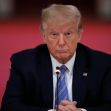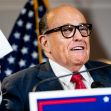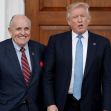On October 19, 2020, Attorney General William Barr appointed Connecticut U.S. Attorney John Durham as special counsel under the same federal regulations that covered special counsel Robert Mueller in the original Russia probe undertaken in May 2017. The order authorizes Mr. Durham “to investigate whether any federal official, employee or any person or entity violated the law in connection with the intelligence, counter-intelligence or law enforcement activities” aimed at the 2016 presidential campaigns, the Trump administration, or anyone affiliated with the campaigns. Mr. Durham will investigate the origins of the Trump-Russia probe, and he is to provide a report of his findings “in a form that will permit public dissemination.”
The investigation into Russian involvement with the 2016 election was code-named Crossfire Hurricane.
A senior Justice Department official has said that the order includes but is “not limited to Crossfire Hurricane and the investigation of Special Counsel Robert S. Mueller III,” but the Durham probe has not been expanded.
In a letter dated December 1, AG Barr advised Congress that he had appointed Mr. Durham on October 19 but delayed telling lawmakers, “given the proximity to the presidential election.”
Mr. Durham was tasked in May 2019 with investigating whether any criminal activity occurred when the Justice Department and FBI handled their investigation. At that point, he had no other title than U.S. attorney. With his new appointment, Durham is covered by federal regulations adopted in the aftermath of the Clinton presidency that govern special counsel and protect that counsel from being easily fired. The special counsel is overseen by the Justice Department but is shielded from political appointees. Only the attorney general can fire the special counsel and only for specific reasons, such as misconduct, dereliction of duty, or conflict of interest. An AG must have written documentation of those reasons and notify Congress of the decision to overrule an investigative or prosecutorial step the special counsel wants to take.
The special counsel rules indicate that the appointed person should be outside of government; AG Barr noted there are specific provisions in his memo that allow him to evade that rule. House Judiciary Committee Chairmen Jerrold Nadler, D-N.Y., questioned how the appointment was allowed under the special counsel rules and opined that this appointment erodes trust in the Justice Department. “And we should not lose sight of the larger picture: in the waning days of the Trump administration, the attorney general has once again used the powers of his office to settle old scores for the president.”
In the statute governing the special counsel, this language appears: “If the Special Counsel believes it is necessary and appropriate, the Special Counsel is authorized to prosecute federal crimes arising from the investigation of these matters.” This language would permit Mr. Durham to bring federal prosecutions at any time.
In July 2016 the FBI initiated an investigation into whether the Trump campaign was working with Russia to affect the presidential election’s outcome. Mr. Mueller inherited that investigation. Although he issued a 2019 report that confirmed Moscow’s interference with the 2016 election and outlined contacts between members of the Trump campaign and Russian operatives, he found insufficient evidence to charge Trump or any associate of his with conspiring with Russia.
President Trump called Mueller’s investigation a “witch hunt” and a “coup” attempt. He tried repeatedly to curtail the probe, which led Mr. Mueller to set forth enough significant evidence of obstruction of justice that impeachment investigations were undertaken.
The early stages of that investigation were fraught with apparent FBI errors. This was documented by an inspector general report from 2019, but that report did not find that the errors were born of partisan bias.
AG Barr decided he would give his appointee the same protection as Mueller so he could continue and finish his work, regardless of the election’s outcome. Barr said that the investigation of the 2016 election would not be finished by the summer of 2020 as originally hoped because of the pandemic and other information discovered along the way.
The investigation now underway is a criminal probe that began with a broad scope. That scope has “narrowed considerably” and is “focused on the activities of the Crossfire Hurricane investigation within the FBI,” according to AG Barr.
Mr. Durham’s investigation has produced one prosecution and one guilty plea by a former FBI attorney, Kevin Clinesmith, who admitted to altering an email.
Although Mr. Durham’s appointment was ostensibly made with an eye toward enabling him to finish his investigation no matter the outcome of the presidential election, this action likely means that President-elect Joe Biden’s Justice Department will have to address Mr. Durham’s investigation.
The Trump administration was unhappy with AG Barr’s and Mr. Durham’s refusal to produce any report or additional charges before the November 3 election.
Democrats were critical of the appointment. Rep. Adam Schiff (D-CA), chairman of the House Intelligence Committee, said, “In an appointment secretly conferred on Durham before the election and only disclosed now that Barr concedes there is no evidence of election fraud to overturn the results, Barr is using the special counsel law for a purpose it was not intended: to continue a politically motivated investigation long after Barr leaves office.”
Republicans were happy with the continuation of the investigation. Sen. Lindsey Graham (R-SC), chairman of the Senate Judiciary Committee, said he hoped Mr. Durham’s “work product will help restore confidence in the Department of Justice and FBI after the debacle called Crossfire Hurricane.”






